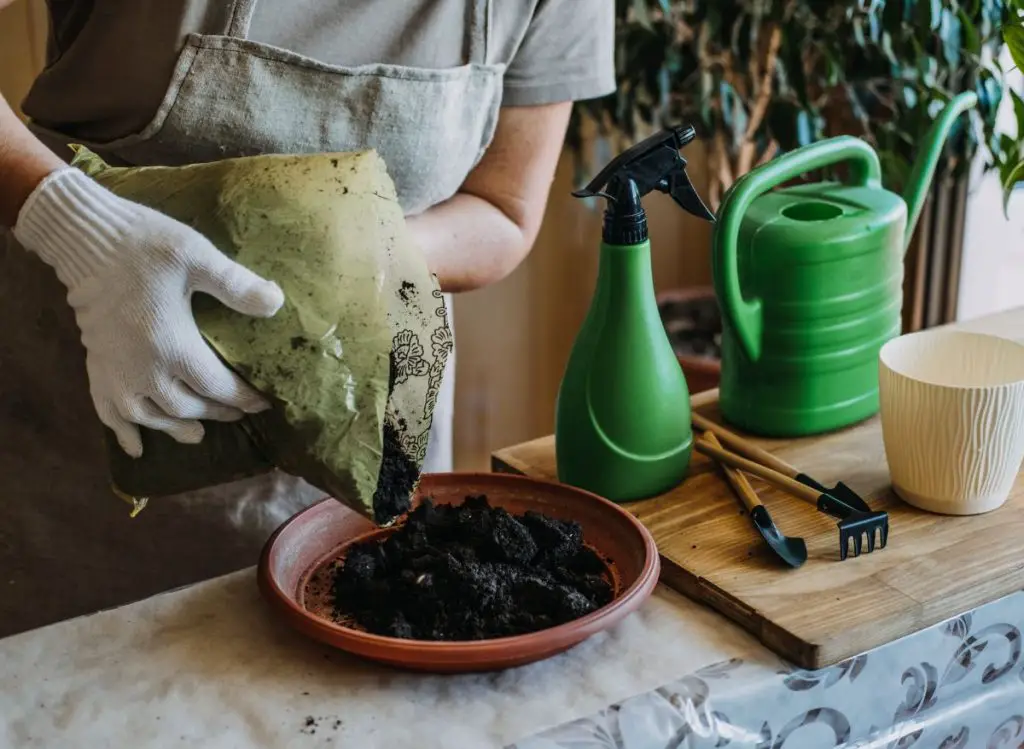
Fertilizing potted plants is essential to houseplant care, which enhances soil fertility and promotes growth. But did you know that there are plenty of natural fertilizers that you can use on your potted plants? And Coffee Grounds are one of these natural fertilizers.
Most people with potted plants wonder, can you put coffee grounds in potted plants? Coffee grounds are excellent natural fertilizers for potted plants, meaning you can use coffee grounds as a fertilizer for your plants. And the good news is that you can apply coffee grounds to your plants because they are cost-effective and provide valuable nutrients to your potted plants.
However, avoid applying coffee grounds on your potted plants directly since this might impair growth, promote fungal overgrowth and facilitate excessive moisture retention.
This article intends to show you how to use coffee grounds effectively without damaging your potted plants.
If you are interested in finding out Which Plants Grow Well With Coffee Grounds? I encourage you to read this article.
Benefits of Coffee Grounds for Houseplants
Although coffee grounds contain nutrients, most people wash them down the drain as kitchen waste items. Read through to discover the benefits of using coffee grounds on your houseplants.
1- Eco-Friendly
Think about living in a world with less pollution, where wildlife is protected and natural resources are better conserved. However, we are all guilty of climate change because every time we throw used coffee grounds in the trash bin, it ends up in the landfill.
The good news is that you make intelligent choices by applying coffee grounds to your houseplant to help reduce the global garbage problem. Additionally, you can reduce household waste by composting coffee grounds to help enrich your compost pile with nitrogen.
On the other hand, adding a coffee ground to your houseplant in moderation is crucial to help increase acidity and essential organic matter, as adding excess can harm your plants.
Apart from reducing environmental pollution, using coffee grounds will contribute to your health as you will minimize the number of chemicals you use on your plants.
2- Rich in Nutrients
Nitrogen is an essential nutrient in all plants that contributes to their growth and survival. Coffee grounds are suitable for your houseplant because they are highly rich in nitrogen.
The nitrogen in coffee grounds can enrich your compost by discouraging garden pests and minimizing weeds that can damage your houseplants. The best way to encourage garden-friendly earthworms is by applying coffee grounds to your plants.
Furthermore, coffee grounds have essential micronutrients like phosphorous, iron, calcium, and sodium that enrich the soil and promote healthy growth for your plants.
3- Easily Available
Coffee is one of the most popularly consumed beverages worldwide. Therefore, it is easy to find coffee grounds in almost every household. Even in homesteads where there are no coffee drinkers, the chances are you can find used coffee grounds from your friends’ neighbors.
Furthermore, why not visit your local coffee shop and request used coffee grounds to help you enrich your house plants? Consequently, take advantage of this easy-to-find household item and experience the reward your plants will give you.
4- Convenient Plant-Care
Let’s face it; plant care is an expensive undertaking that will cost you a couple of dollars. However, the good thing about using coffee grounds is that only a small amount is needed to enrich your houseplants.
Moreover, you can apply used coffee grounds after enjoying your favorite cuppa since they are less acidic than fresh ones. Additionally, coffee grounds are economical since you do not need other commercial fertilizers that produce a similar result.
If you want to improve soil aeration, drainage, and water retention on your houseplants, the coffee ground is a convenient plant-care fertilizer you should consider.
On the other hand, applying coffee grounds to your potted plants in thick layers can hinder water absorption and increase mold growth; hence you can opt to compost them instead of adding them directly to your house plants.
Are you interested in exploring How To Use Coffee Grounds as fertilizers? I wrote an article that discusses the best tips for using coffee grounds as fertilizer; I encourage you to read this article to learn how to properly and efficiently Use Coffee Grounds as a natural fertilizer.
List of Potted Plants that Do Well in Coffee Grounds
Potted plants add beauty to your home. Since most of them have limited space, ensure to use coffee grounds in limited quantities; otherwise, they can be damaged.
Not all potted plants appreciate coffee grounds; therefore, peruse the list to discover the ones you will enjoy.
1- Jade Plant
If you directly apply coffee grounds to potted plants, it may increase fungal growth, pest infestations, acidity in the soil, and stunted growth. The succulent plant is unique and appreciates coffee grounds because they do well in acidic soil.
However, use coffee grounds in moderation as a liquid fertilizer or compost instead of applying them directly to the jade plant for the best results. Since the coffee ground is often acidic, checking the soil’s acidity before using them will help your jade plant to thrive.
You can use coffee grounds on your jade plant occasionally, every six months, or yearly to promote better water retention and stem growth.
This is because jade plants do well in dry soil conditions; therefore, refrain from overwatering your potted jade plant to discourage root rot. Since jade plants rarely flower annually, using the correct amount of coffee grounds will ensure it stays in an ideal environment and encourage flowering.
With the beautiful flowers popping up, you can confidently place your jade plant at the entrance door and enjoy the harmony it brings.
2- Peace Lily
Peace lily is a fresh and adaptable potted plant in most households. Its leaves can blossom with a little dash of coffee ground, thanks to the high nitrogen content and other micronutrients like potassium and phosphorous.
Furthermore, adding coffee grounds to your peace lilies acts as a pest repellent and reverses leaf discoloration. Finally, adding coffee grounds to your potted peace lilies can improve drainage and aeration in the soil.
Fresh coffee grounds are highly acidic and encourage water retention and fungal growth. For better results, refrain from using coffee grounds directly on your potted peace lily; dilute it with water before applying it to the soil.
However, adding coffee grounds to acidic soil lowers its pH value further, which can affect the growth of peace lilies.
See also: Signs Of Under Watered Vs. Overwatered Peace Lily (And how to fix them properly!)
3- African Violet
African violet is one the most popular potted plant globally, thanks to its beautiful colors and leaves that grow in various forms. Furthermore, a dash of coffee grounds can help them blossom and maintain their flowers all year round.
African violets thrive well with coffee grounds due to their high nitrogen and acidity. Moreover, coffee grounds will repel insects from your potted African violet and minimize the need to use hazardous chemicals.
Mixing coffee grounds with egg shells provides essential minerals like phosphorus and calcium to your potted plant, which facilitates healthy growth.
On the other hand, refrain from using flavored and sweetened coffee grounds as it affects its nutritional value and can lead to stunted growth of your potted plant.
See also: How to Properly Care For African Violets? And make them bloom.
4- Christmas Cactus
Christmas is often a big deal for many households worldwide. And Christmas cactus is undoubtedly one of the decorations you will need to improve your home appearance. However, this plant needs a little help from you to thrive.
It requires potassium and nitrogen to blossom, and coffee grounds are packed with these nutrients. Therefore, rather than throw away your used coffee grounds sprinkle some of them on your potted Christmas cactus plant, and this help will go a long way in helping them blossom.
But when can you introduce coffee grounds to your cactus plant? Some growers suggest sprinkling a little coffee ground when the plant comes out of its dormancy.
See also: Top Reasons Why Do Succulents Change Color.
5- Philodendron
Many houseplant lovers adore philodendrons due to their luxuriant leaves. However, these leaves do not come by chance; they excel in lots of nitrogen.
We all know that coffee grounds have a high nitrogen content, and if used in moderation on Philodendron plants, you can expect wonders.
How frequently should you apply coffee grounds to these potent plants? You can apply them monthly to facilitate growth and achieve glossy leaves. However, when applying coffee grounds on Philodendron, use it sparingly since, in excess, it will create a compact layer that interferes with nutrient absorption.
Many households have found it helpful to use coffee grounds when planting or repotting Philodendron plants to facilitate their recovery from shock. However, unlike other potted plants that do well in highly acidic conditions, Philodendron performs better with slightly acidic soil.
Therefore, test the pH level of your soil before adding coffee grounds to minimize burning the plant roots and discourage stunted growth. You can buy a pH meter to test your soil on Amazon; here’s a link.
You might also enjoy reading: How Often Do African Violets Bloom? (This is what I found out!)
Are Used Coffee Grounds Good For Indoor Plants?
With proper applications, coffee grounds can be an excellent nitrogen source to help your houseplants grow fast and maintain their health and beautiful leaves. In addition, coffee grounds can be particularly beneficial to houseplants when used as a fertilizer, mulch, pesticide, or even compost.
You might wonder how to use coffee grounds for potted plants. The best way to use coffee grounds for plants is by adding it to your compost pile and mixing it with compost and your potting soil.
If you are interested in exploring How To Use Coffee Grounds as Fertilizer, I encourage you to read this article.
Final Remarks
Coffee grounds provide essential nutrients to your potted plants, thus, helping them grow. Moreover, nitrogen in coffee grounds plays a crucial role in promoting bigger and more colorful blooms.
However, how your houseplants thrive after applying coffee grounds depends on how you use them. Therefore, use coffee grounds as compost or liquid fertilizer instead of spreading them directly on your potted plants.
Moreover, using coffee grounds in moderation will go a long way in helping your potted plants to thrive. Always check the pH levels of the soil before applying coffee grounds on young plants since they cannot tolerate high acidity.

